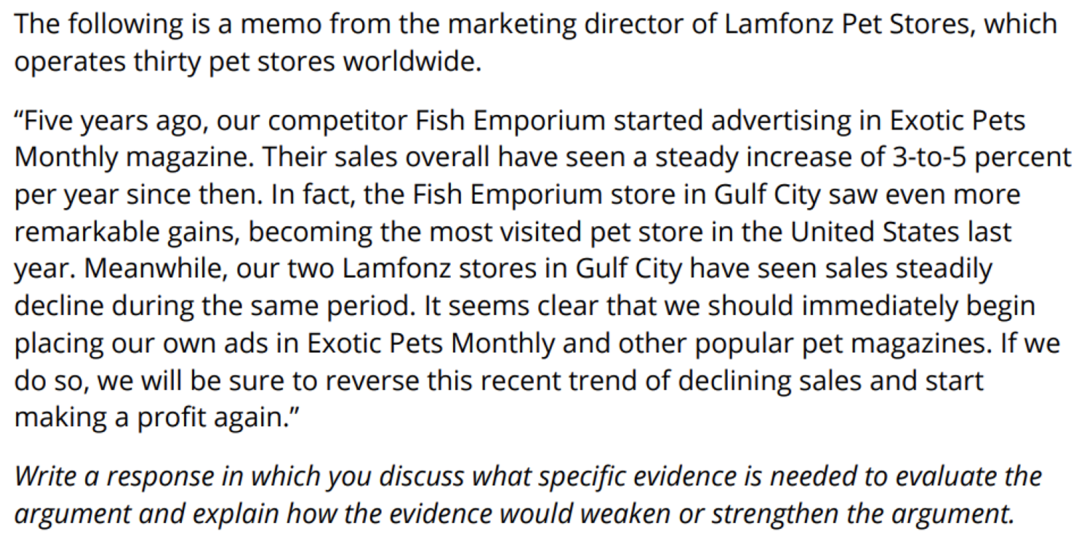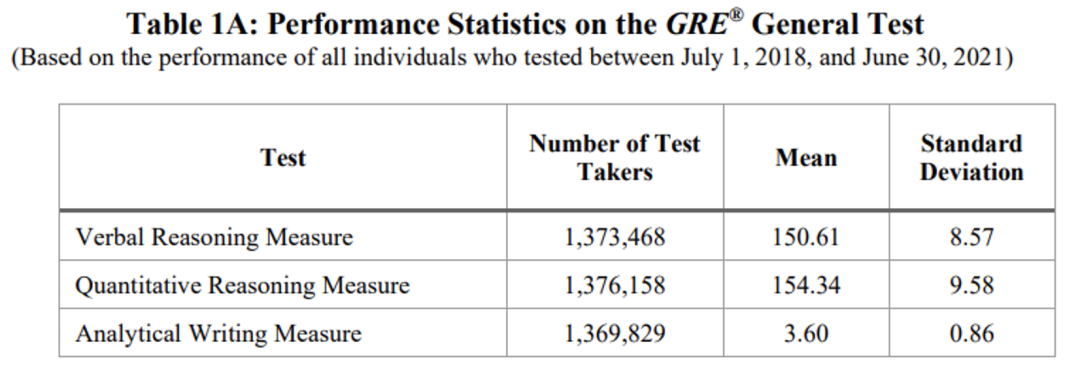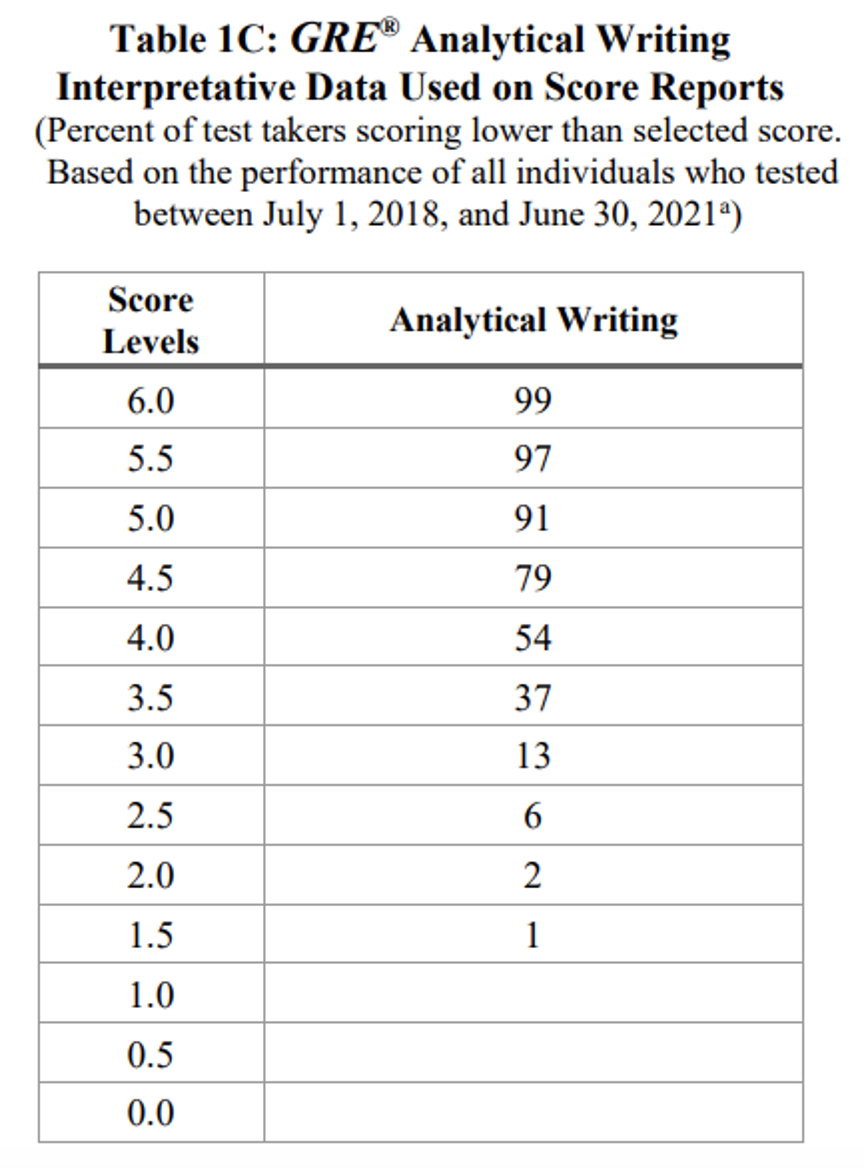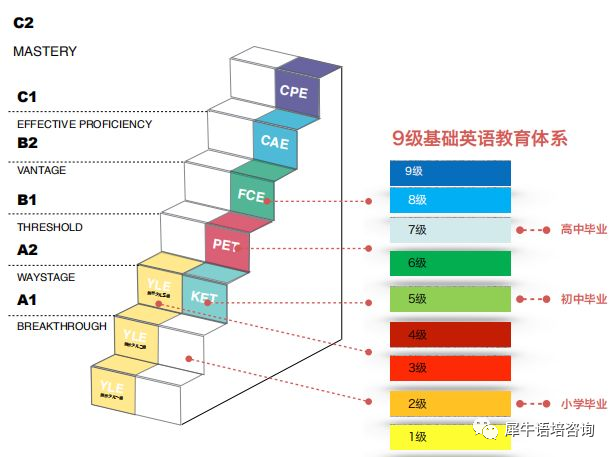GRE写作基本介绍
做为整套考试的首考模块,GRE分析性写作是GRE考试的一个重要组成部分,主要用于评估考生的分析、评价、辩论和表达能力。写作模块包括两篇文章:分析问题(AWA Issue)和分析论证(AWA Argument)。考试时长为60分钟,每篇文章30分钟。
GRE Issue Task
主要评估考生对一个普遍议题进行批判性思考并以书面形式清晰呈现自己想法的能力。每个议题都提出了一个可以从不同角度讨论并可应用于许多不同情况或条件的观点,考生的任务是呈现清晰的立场并进行令人信服的论证。
官方例题:

GRE Argument Task
除了考察英文写作的书面表达能力以外,更侧重于评估考生根据特定指令理解、分析并深刻评价他人论述逻辑的能力。考生不需要讨论论点中的陈述是否真实或准确,也不需要同意或反对他人所陈述的立场。相反,考生需要批判性地检查另一位作者的推理过程和证据使用,讨论作者论点的逻辑合理性。
官方例题:

GRE写作分数
GRE写作分数的范围是0-6,以0.5分为一个单位。考试成绩单上的写作成绩是两个任务的平均分四舍五入到最接近的半分。一般来说,分数越高,表明考生在批判性思维、论点组织和英文书面表达等方面的能力越强。
评分过程包括两个阶段。首先,人工评分员根据官方评分标准对两篇文章进行评分。此外,机器评分系统(e-rater)也会对文章进行打分。如果两者之间的分数相差不大,那么将取它们的平均分作为最终成绩。如果分数相差较大,将会有另一位人工评分员对文章进行评分,最终分数将取自两位人工评分员打分的平均值。
值得注意的是,GRE写作特别强调文章的原创性。在评分过程中,考生的考场作文将由经过培训的分析员使用 ETS essay-similarity-detection software(作文相似性检测软件)以及经验丰富的作文评分员进行审核。若发现有抄袭的证据,考生分析性写作的分数将会被取消。由于写作分数是GRE综合考试成绩的重要组成部分,因此整场考试的成绩也将会被取消。
在研究生申请过程中,GRE写作成绩也起着重要作用。虽然每个学校和项目对写作成绩的要求不同,但是一般来说,3.5分以上被认为是及格线,4.0分以上则被认为是比较理想的成绩。4.5分以上则被认为是非常有竞争力的分数。有些学校和项目可能对写作成绩有更高的要求,特别是那些注重写作和沟通能力的项目,如人文学科、社会科学和商学院。
同学们可以通过以下网站查询官方接受GRE分数的院校以及送分代码:
https://www.ets.org/gre/test-takers/general-test/scores/send-scores/approved-recipients.html
一些数据
根据ETS官方数据显示,2018-2021全球GRE考生的平均写作分数为3.6分。从2020-2021年的官方统计来看,美国考生平均分数为4.0,而中国大陆地区的考生则为3.3。

考生的分数情况也因申请的专业而异。例如,根据2020年6月到2021年6月的数据统计,意向申请Business项目的考生写作平均分为3.7,Education专业的数据是3.6,Engineering方向的平均分为3.4,Humanities and Arts相关专业的平均分则高达4.1。
整体来看,分数达到3.0的考生可以超过13%的竞争者;达到4.0的考生可以超过54%的竞争者;若能考到5.0分以上,则已然进入第一梯队了(前10%)。

GRE写作能力
从以上数据可以看出,中国GRE考生的写作成绩与全球平均水平相比仍有明显差距。论证不充分、逻辑不严密、语言使用不当等往往是中国考生在GRE写作方面普遍存在的问题。这往往是由于中国考生对西方论证方式不熟悉和对英文书面写作练习量不够导致的。认真备考GRE写作,不仅是要在分数上迎头赶上,更是让自己达到研究生院入学要求以及提前适应高强度学术生活的重要保障:
批判性思维能力
GRE写作两个任务的重点目标之一就是测试考生的批判性思维能力。通过对给定议题和论证的分析,考生需要展示他们能够识别问题、评估观点、提出有说服力的论据以及组织思路。这些技巧对于研究生项目中的文献阅读,独立研究、课堂讨论,及撰写论文等活动至关重要。
逻辑推理和分析能力
GRE写作对考生的逻辑推理和问题分析能力提出了挑战。特别是Argument部分,考生需要针对给定的论证进行深入剖析,找出其中的逻辑漏洞、假设以及证据。在研究生课程中,这些能力对于完成课程论文、研究项目以及解决实际问题至关重要。特别是遇到数据分析、理论评估和方案策划时,出色的逻辑分析能力可以帮助他们在研究生阶段更有效地应对各种挑战。
评估沟通技巧
GRE写作部分还测试了考生在学术环境中的沟通技巧。一个优秀的研究生申请者需要准确读懂对方需求,判断周围环境,并清晰准确地表达他们的观点和想法。这对于论文创作、项目研究以及与教授和同学进行有效沟通都至关重要。考生通过GRE写作任务也可以向院校的招生委员会展示他们具备这些必要技能。
书面写作技巧
除了思维和沟通技巧外,GRE写作部分还测试了考生的全方位的书面写作技巧。这包括语法、句子结构、段落组织以及语言的准确性和流畅性。这些能力对于研究生阶段的学术写作至关重要。展示出良好的书面写作技巧有助于考生匹配自己其他申请材料中的书面写作部分,进一步向招生委员会证明自己的能力。
考生习作分析
接下来我们将以一篇考生的GRE Argument实际考试的5分范文为例,带大家近距离感受GRE写作。
例题文本
The Following report appeared in the newsletter of the West Meria Public Health Council.
"An innovative treatment has come to our attention that promises to significantly reduce absenteeism is our school and workplaces. A study reports that in nearby East Meria, where fish consumption is very high, people visit the doctor only once or twice per year for the treatment of colds. Clearly, eating a substantial amount of fish can prevent colds. Since colds represent the most frequently given reason for absences from school and work, we recommend the daily use of Ichthaid--a nutritional supplement derived from fish oil--as a good way to prevent colds and lower absenteeism."
写作指令
Write a response in which you discuss what specific evidence is needed to evaluate the argument and explain how the evidence would weaken or strengthen the argument.
考场范文
In the newsletter, the author makes a seemingly compelling conclusion that taking Ichthaid can effectively lower the rate of absenteeism. Nonetheless, the conclusion reached in the newsletter conveys an evident paucity of evidence, which cannot be firmly corroborated. Thus, more substantial evidence should be offered by the author.
To start with, more evidence should be provided to prove that the school has no regional differences with East Meria. It is widely known that each region has its own unique and distinct situations. Therefore, a report conducted in East Meria may not be highly informative and useful for the school. Residents living in these two areas may manifest distinct reasons for absenteeism, despite their vicinity. It is likely that people in East Meria go to see the doctor less frequently because they acquire an overall higher quality of life, which prevents them from getting sick. The differences in absenteeism between the two areas may be attributed to other factors such as economic development and geographical distribution. If this holds true, eating more Ichthaid would not be very helpful for the school.
Furthermore, the author should cite more evidence to approve that the colds are the major culprit for absenteeism. Based on our common sense, there a multitude of causes that can trigger a high rate of absenteeism, including the dissatisfying studying environment, poor interpersonal relationships, and bad weathers. The author merely mentions one factor, but he mistakenly considers it as the one and foremost cause for absenteeism. It is possible that the absenteeism in the schools and workplaces is resulted in by a higher population density. As a consequence, colds are easier to transfer from one person to another, thus infecting a larger number of people more rapidly. Even if the residents in East Meria did not take any Ichthaid, they might still have a lower frequency of getting colds, as the population density in that region was significantly lower.
Finally, more evidence is needed to substantiate the assumption that taking Ichthaid equals to eating fish. To say the least, even if we acknowledge the value of eating fish in preventing colds, we can hardly guarantee that it is the Ichthaid which brings about this benefit. Numerous substances are contained in a fish, and it is utterly challenging to determine which one or ones of them are effective substances to prevent colds. It is likely that some other substances in fish can enhance people's physical conditions and help them to resist colds. Or, Ichthaid is effective when combined with other substances in fish. Thereby, taking Ichthaid may probably not lead to the benefit suggested by the author. Unless the specific substances that are effective can be defined, this advice is highly baseless.
In a nutshell, the article lacks sufficient evidence to back its conclusion. To make the proposal more compelling, the author should first provide more thorough and detailed evidence.
(479 words)
写作点评
a) 观点的说服性
考生成功地指出了文章中的逻辑漏洞,如地区差异、感冒与缺勤率之间的关系以及鱼油补充剂与吃鱼之间的关联。这些观点表明了考生具备较强的批判性思维能力。
b) 论证与支持
考生对原作者论点的缺陷提供了一些合理的解释,也提供了一些有力的例证。但论证支撑部分并不是十分详细或具体,在对比和因果关系的论证方面也还有待加强。
c) 组织结构
考生的文章组织结构清晰且合乎逻辑。开头段有效地总结了论点,并指出作者需要提供更多的证据。每个主体段落都集中讨论一个特定的论证缺陷,结论也有效地重述了主要观点。这使得文章的主旨能始终清晰地呈现。
d) 句法多样性
考生展示了简单句和复杂句的混合使用,句法地使用基本符合规则。但句式地多样性有些受限。考生可以使用更丰富多样的句子结构来传达更多的句法功能,创造更好的阅读体验。
e) 语言运用成熟度
考生具备了良好的词汇量,并基本能够准确地使用常见词汇。但在某些地方存在不是特别地道的措辞或不合适的词语选择。句意传达基本流利,但有些句子需要重新组织措辞以提高清晰度和准确性。
GRE写作题库
最后,也是GRE最有价值的资料之一。ETS为帮助考生更有效地备考GRE分析写作考试,已经在官网公布了整个写作考试题库并会不定期更新。正式考试中的写作任务将从中随机选择。
Issue Topic Pool
Argument Topic Pool
同学们可以根据自己的备考需求,在专业老师的指导下合理使用这份宝贵的题库。













